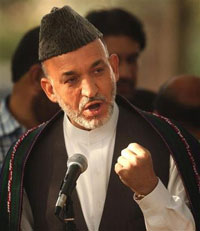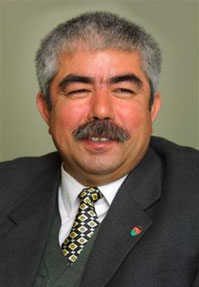|
Afghan president drops warlord from ticket
(Agencies)
Updated: 2004-07-27 11:22
Afghan President Hamid Karzai dropped a powerful warlord to add the brother of a slain Afghan hero to his electoral ticket Monday. The surprise move followed political wrangling so intense that NATO peacekeepers stepped up their presence in the streets of Kabul.
The U.S.-backed interim leader selected a little-known brother of resistance hero Ahmad Shah Massood as his chief running mate, a move sure to test this volatile nation's fragile ethnic and factional balance.

Afghan President Hamid Karzai answers question during a press conference at the Presidential Palace in Kabul, Afghanistan, on Monday, July 26, 2004. Karzai announced his candidacy Monday for landmark October elections after several days of heated political wrangling. [AP] |
"I hope the Afghan people will recognize us as a good team and I hope the people of Afghanistan will vote for us," Karzai told reporters summoned to a shady courtyard of the presidential palace.
Karzai, beaming under his trademark woolen hat, was flanked by his vice presidential choices for the Oct. 9 vote as well as dozens of aides and security guards. But he appeared to have lost the support of snubbed Defense Minister Mohammed Fahim, his current first vice president and arguably Afghanistan's most powerful warlord, as well as the backing of his foreign and education ministers.
Ahmad Zia Massood, an ethnic Tajik, is Afghanistan's current ambassador to Russia and a brother of Ahmad Shah Massood, who led the resistance to the Taliban regime until he was killed by al-Qaeda terrorists on Sept. 9, 2001. Karzai, a member of the country's main Pashtun group, named ethnic Hazara leader Karim Khalili his choice for second vice president.
That lineup is likely to appeal across the country's deep ethnic divides. It will also help Karzai shake off a reputation for using kid gloves with the warlords who dominate much of the country.
Karzai is the overwhelming favorite to beat about a dozen challengers and win a five-year term. However, the race has heated up in recent days, with declarations first by Abdul Rashid Dostum, an ethnic Uzbek strongman, and now Education Minister Yunus Qanooni, an ethnic Tajik, that they would run.
The vote, the first direct presidential election in Afghan history, is seen as a referendum on the international community's patchy efforts to rebuild the country after more than two decades of fighting.

Powerful Afghan warlord Gen. Abdul Rashid Dostum, during an interview at his home in Shibergan, northern Afghanistan, on Friday, April 26, 2002. Dostum will challenge President Hamid Karzai in the country's historic October elections, his spokesman said Thursday July 22, 2004, clouding the U.S.-backed incumbent's chances of a clear victory. [AP] |
Fahim and Foreign Minister Abdullah were conspicuously absent from Karzai's news conference. The president said he was "sorry" the defense minister was not there, and went on to praise him as a "brother" and "great warrior."
Abdullah was too busy, he said.
But a close aide to Fahim said he and the foreign minister would now throw their weight behind Qanooni, who also came forward before Monday's deadline for nominations.
Fahim "strongly supports Qanooni's candidacy," said Mohammed Abil, the aide.
Both Abil and Karzai insisted there was no tension between the president and Fahim, who have led Afghanistan since Fahim's Northern Alliance militias helped the United States to rout the Taliban in 2001.
However, there was speculation as to how long Fahim would remain in Karzai's Cabinet.
Under new electoral laws, all candidates except the president must temporarily resign from their posts, meaning Fahim would have had to relinquish his grip on the Defense Ministry in order to stand as Karzai's vice presidential pick. He was reportedly pushing to install a loyalist as defense chief to rule the ministry in his stead.
Fahim has failed to deliver on a promise to disarm thousands of militiamen in time for the elections. Thousands of his soldiers remain in the capital, and NATO troops who patrol the city took no chance Monday on potential trouble.
German and Canadian armored vehicles picked their way through crowded thoroughfares and thundered through the back streets. Later, unmanned surveillance drones and helicopters patrolled over the darkened city.
Cdr. Chris Henderson, a spokesman for the NATO-led security force in the capital, said patrols were increased because of the rising political temperature.
"We are very confident that this is a peaceful political dialogue that is going on and that it will be resolved peacefully, but military organizations have to take prudent measures in case things turn out differently," he said.
Karzai will also have to deflect criticism that he and his American backers have failed to halt attacks by insurgents who have chased away relief workers from the impoverished south and east. Two election workers were killed and three American soldiers wounded in fresh violence reported Monday.
Karzai, who said recently that unruly militias were a bigger obstacle that Taliban militants, promised to present his "plan for the future" to long-suffering Afghans in the coming days, "for all that it takes to build a strong society based on a strong economy and legal foundations."
|